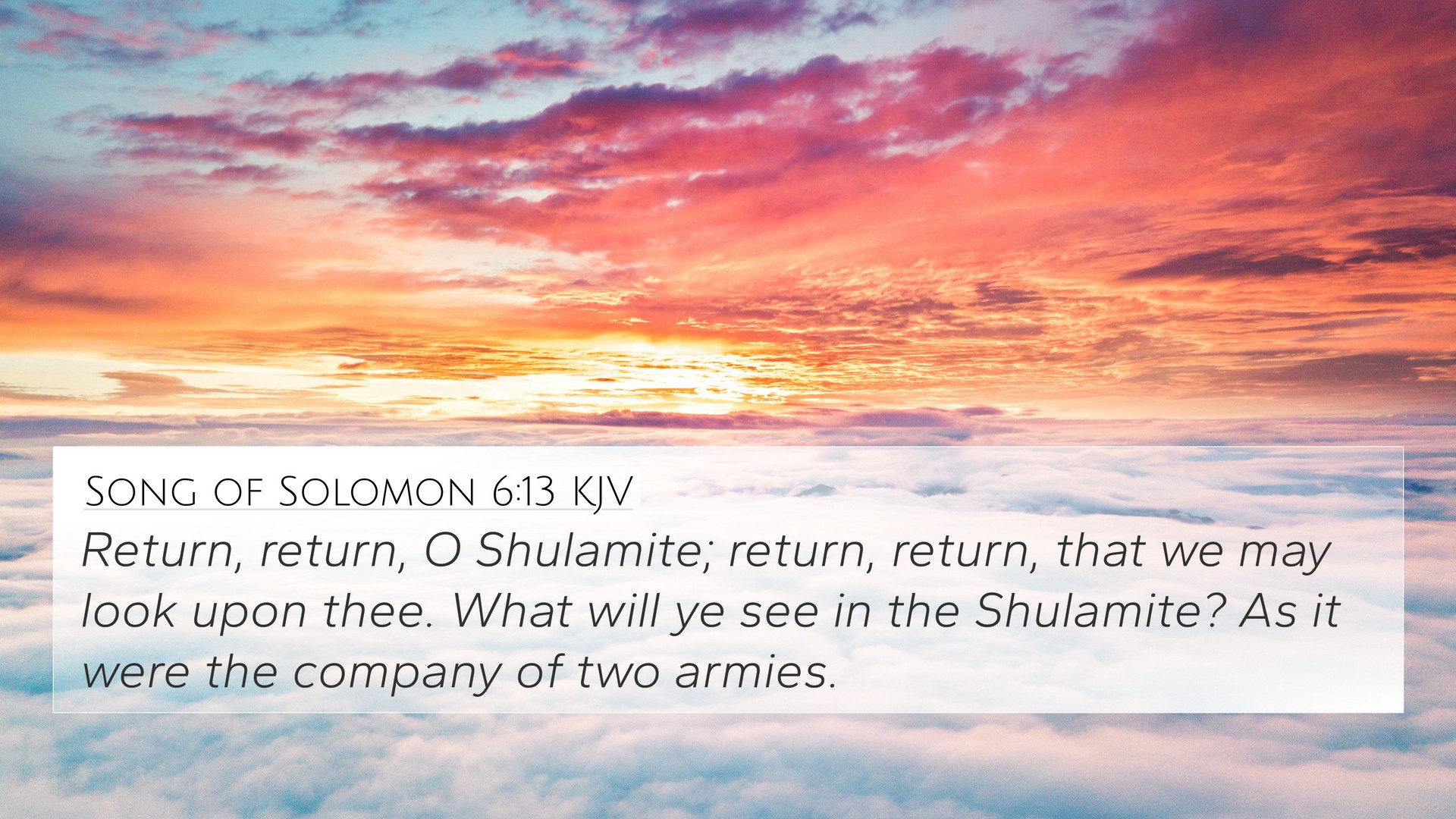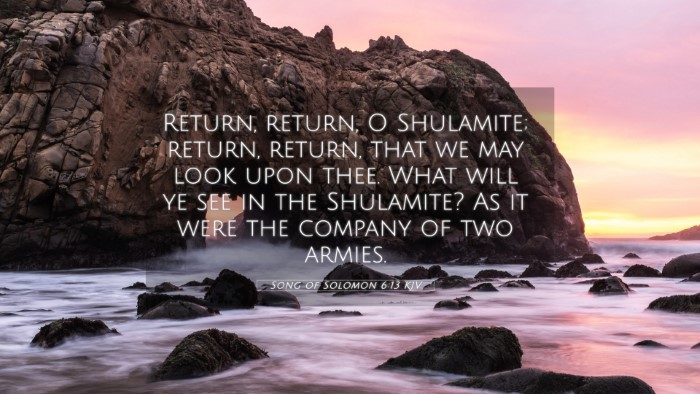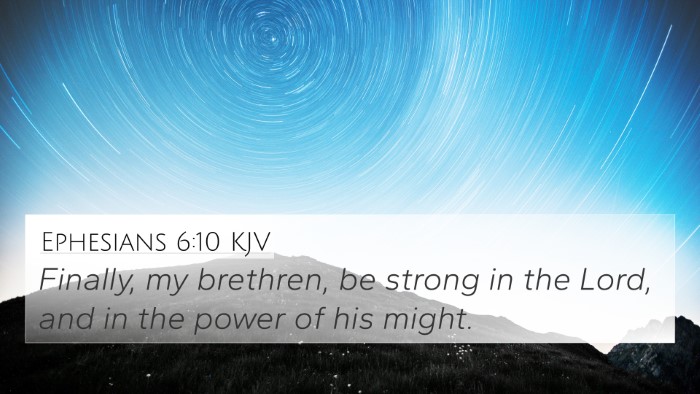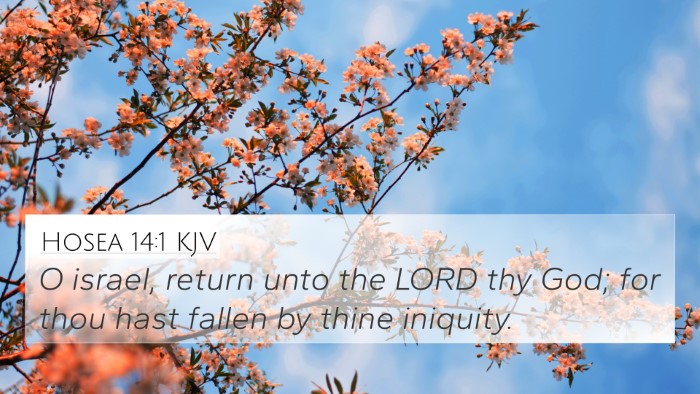Old Testament
Genesis Exodus Leviticus Numbers Deuteronomy Joshua Judges Ruth 1 Samuel 2 Samuel 1 Kings 2 Kings 1 Chronicles 2 Chronicles Ezra Nehemiah Esther Job Psalms Proverbs Ecclesiastes Song of Solomon Isaiah Jeremiah Lamentations Ezekiel Daniel Hosea Joel Amos Obadiah Jonah Micah Nahum Habakkuk Zephaniah Haggai Zechariah MalachiSong of Solomon 6:13 Similar Verses
Song of Solomon 6:13 Cross References
Return, return, O Shulamite; return, return, that we may look upon thee. What will ye see in the Shulamite? As it were the company of two armies.
Song of Solomon 6:13 Cross Reference Verses
This section features a detailed cross-reference designed to enrich your understanding of the Scriptures. Below, you will find carefully selected verses that echo the themes and teachings related to Song of Solomon 6:13 KJV. Click on any image to explore detailed analyses of related Bible verses and uncover deeper theological insights.

Genesis 32:2 (KJV) »
And when Jacob saw them, he said, This is God's host: and he called the name of that place Mahanaim.

Luke 7:44 (KJV) »
And he turned to the woman, and said unto Simon, Seest thou this woman? I entered into thine house, thou gavest me no water for my feet: but she hath washed my feet with tears, and wiped them with the hairs of her head.

John 9:7 (KJV) »
And said unto him, Go, wash in the pool of Siloam, (which is by interpretation, Sent.) He went his way therefore, and washed, and came seeing.
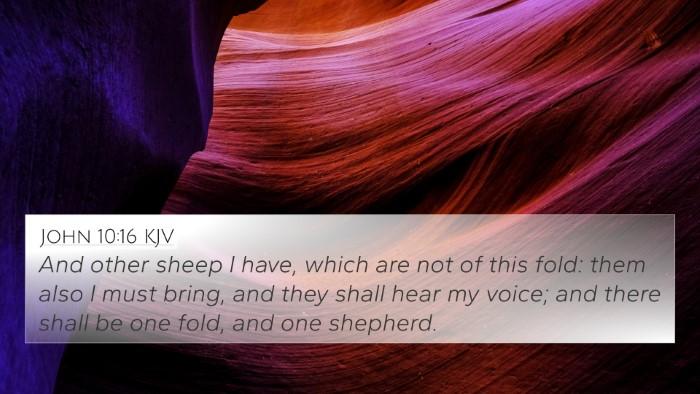
John 10:16 (KJV) »
And other sheep I have, which are not of this fold: them also I must bring, and they shall hear my voice; and there shall be one fold, and one shepherd.
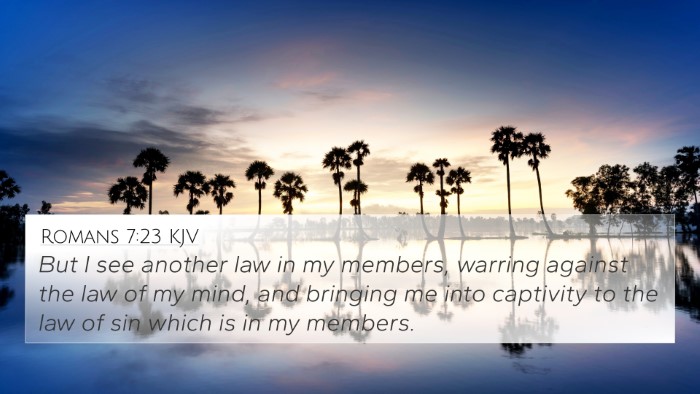
Romans 7:23 (KJV) »
But I see another law in my members, warring against the law of my mind, and bringing me into captivity to the law of sin which is in my members.
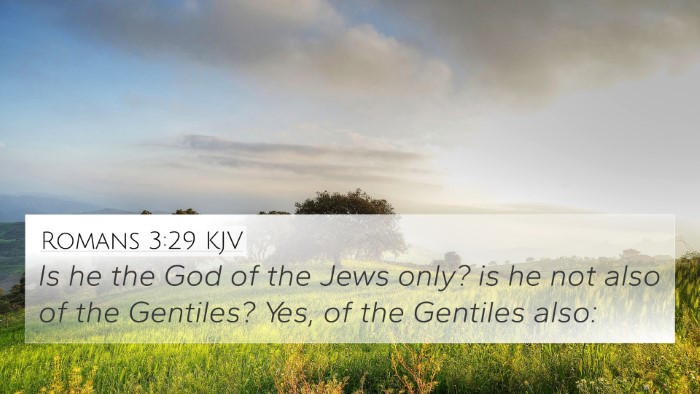
Romans 3:29 (KJV) »
Is he the God of the Jews only? is he not also of the Gentiles? Yes, of the Gentiles also:
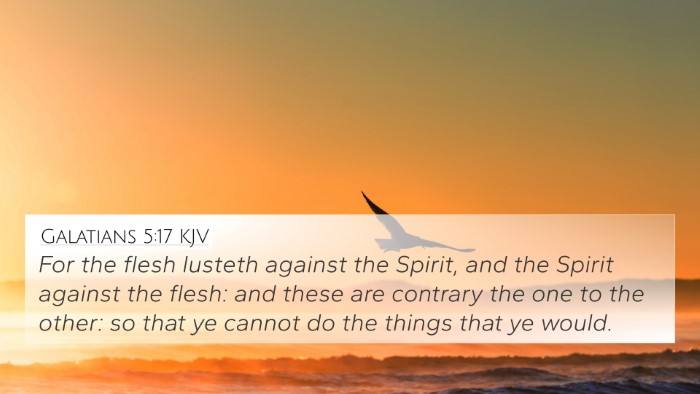
Galatians 5:17 (KJV) »
For the flesh lusteth against the Spirit, and the Spirit against the flesh: and these are contrary the one to the other: so that ye cannot do the things that ye would.

Ephesians 2:14 (KJV) »
For he is our peace, who hath made both one, and hath broken down the middle wall of partition between us;

2 Thessalonians 1:10 (KJV) »
When he shall come to be glorified in his saints, and to be admired in all them that believe (because our testimony among you was believed) in that day.

Luke 15:10 (KJV) »
Likewise, I say unto you, there is joy in the presence of the angels of God over one sinner that repenteth.

Genesis 49:10 (KJV) »
The sceptre shall not depart from Judah, nor a lawgiver from between his feet, until Shiloh come; and unto him shall the gathering of the people be.
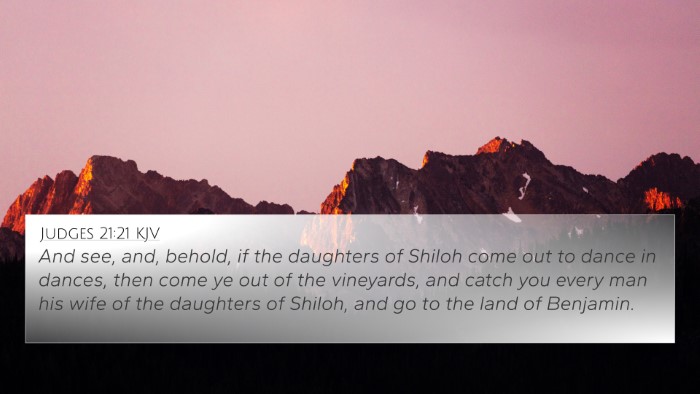
Judges 21:21 (KJV) »
And see, and, behold, if the daughters of Shiloh come out to dance in dances, then come ye out of the vineyards, and catch you every man his wife of the daughters of Shiloh, and go to the land of Benjamin.
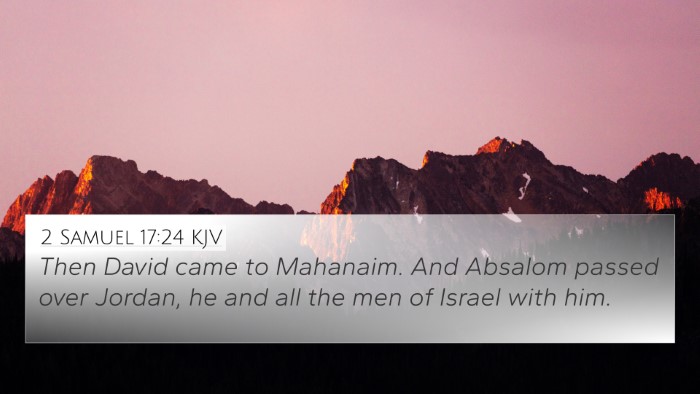
2 Samuel 17:24 (KJV) »
Then David came to Mahanaim. And Absalom passed over Jordan, he and all the men of Israel with him.

Song of Solomon 2:14 (KJV) »
O my dove, that art in the clefts of the rock, in the secret places of the stairs, let me see thy countenance, let me hear thy voice; for sweet is thy voice, and thy countenance is comely.

Song of Solomon 1:6 (KJV) »
Look not upon me, because I am black, because the sun hath looked upon me: my mother's children were angry with me; they made me the keeper of the vineyards; but mine own vineyard have I not kept.

Isaiah 8:6 (KJV) »
Forasmuch as this people refuseth the waters of Shiloah that go softly, and rejoice in Rezin and Remaliah's son;
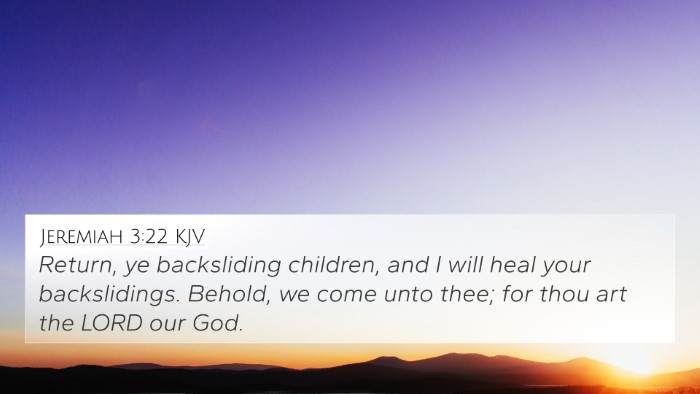
Jeremiah 3:22 (KJV) »
Return, ye backsliding children, and I will heal your backslidings. Behold, we come unto thee; for thou art the LORD our God.

Jeremiah 3:12 (KJV) »
Go and proclaim these words toward the north, and say, Return, thou backsliding Israel, saith the LORD; and I will not cause mine anger to fall upon you: for I am merciful, saith the LORD, and I will not keep anger for ever.
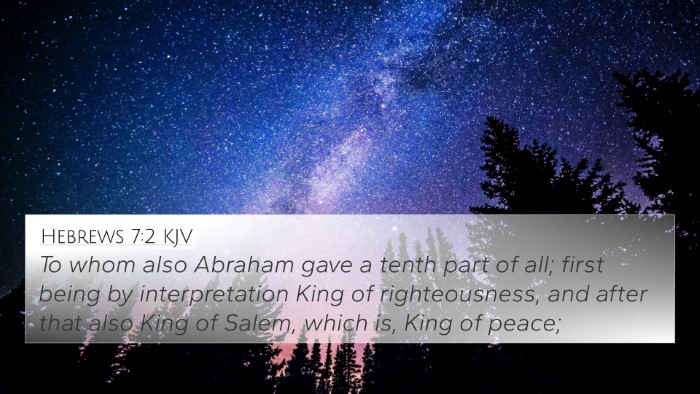
Hebrews 7:2 (KJV) »
To whom also Abraham gave a tenth part of all; first being by interpretation King of righteousness, and after that also King of Salem, which is, King of peace;
Song of Solomon 6:13 Verse Analysis and Similar Verses
Understanding Song of Solomon 6:13
Verse: "Return, return, O Shulamite; return, return, that we may look upon thee. What will ye see in the Shulamite? As it were the company of two armies."
Overall Meaning
The verse from the Song of Solomon reflects a desire for the Shulamite woman to return, highlighting her beauty and the attention she draws. This passage captures both the romantic longing of the beloved and the intrigue that surrounds the Shulamite. Commentators agree that this poetic text is rich with imagery and layered meanings.
Commentary Insights
-
Matthew Henry:
Henry emphasizes the call for the Shulamite to return, which signifies a desire for companionship and connection. The phrase "that we may look upon thee" suggests that her presence is captivating, representing beauty and grace. This mutual attraction reflects the desire for intimacy and communion within love.
-
Albert Barnes:
Barnes notes the repetition of the call to "return," which may imply a sense of urgency or desperation from the speaker. He interprets the comparison to "the company of two armies" as a representation of the Shulamite’s splendor, showcasing how the sight of her inspires admiration and awe, akin to a battle array that captures one’s attention.
-
Adam Clarke:
Clarke discusses the cultural context of this verse, interpreting "Shulamite" as indicative of a woman from the region of Shunem, denoting her beauty and nobility. He also reflects on how this passage can symbolize the relationship between God and His people, where the yearning expressed represents a divine pursuit of the beloved soul.
Related Bible Cross References
- Song of Solomon 1:15: "Behold, thou art fair, my love; behold, thou art fair; thou hast dove's eyes." - This similar theme of beauty resonates throughout the Song.
- Isaiah 61:3: "To appoint unto them that mourn in Zion, to give unto them beauty for ashes." - Highlights the transformation and beauty metaphor linked to love.
- Matthew 5:14: "Ye are the light of the world. A city that is set on a hill cannot be hid." - Suggests how love shines brightly, drawing attention and admiration.
- Proverbs 5:18: "Let thy fountain be blessed: and rejoice with the wife of thy youth." - Speaks to the joy and beauty of marital love.
- 1 John 4:19: "We love him, because he first loved us." - Reflects on the nature of love echoing the longing in the verse.
- Revelation 22:17: "And the Spirit and the bride say, Come." - A culmination of longing for communion that mirrors the sentiments found in Song of Solomon.
- Philippians 1:8: "For God is my record, how greatly I long after you all in the bowels of Jesus Christ." - Expresses deep longing akin to the yearning present in this verse.
Thematic Connections
This verse serves as a focal point for the examination of love themes throughout Scripture. Not only does it expound on romantic love, but it also draws significant connections to spiritual love and longing portrayed in both the Old and New Testaments. The rich imagery allows for various interpretations based on both relational and spiritual frameworks.
Cross-Referencing Biblical Texts
Utilizing a broad cross-referencing approach provides deeper insights into the interconnected nature of Scripture. By cross-referencing relevant Scriptures, one can explore the expansive themes of love, beauty, and longing.
- Tools for Bible cross-referencing: Employing a Bible concordance or cross-reference guide can enhance understanding.
- Comparative Bible verse analysis: Investigating parallels across different books of the Bible illustrates how similar themes resonate across various contexts.
- Identifying connections: Exploring the relationships between Old and New Testament disclosures enriches one’s comprehension of Biblical love narratives.
Conclusion
Song of Solomon 6:13 reflects a deep yearning for connection and beauty, celebrated through poetic language. Understanding this verse through various public domain commentaries enriches the reader’s perspective, allowing for a more profound engagement with the text. As we consider the numerous Bible verse parallels and thematic ties, the interconnectedness of love throughout the Scriptures becomes ever more apparent.
